Engaging Young People in Humanitarian Aid: Challenges and Solutions
VerifiedAdded on 2022/10/12
|8
|2154
|9
Essay
AI Summary
This essay delves into the challenges of engaging young people in humanitarian aid, focusing on the author's experiences as an educator. The core issues discussed include the lack of empathy among students, feelings of guilt regarding their inability to contribute financially, and the development of skepticism and sadness related to humanitarian crises. The author details strategies employed to address these challenges, such as fostering empathy through discussions and volunteering opportunities, providing guidance on how young people can contribute, and organizing discussions and documentary screenings to combat skepticism. The essay highlights the importance of empowering young people to understand humanitarian issues and encourages their involvement in volunteer activities and community service. The conclusion emphasizes the potential of the younger generation to contribute innovative solutions to humanitarian challenges. The essay references several academic sources to support its arguments.
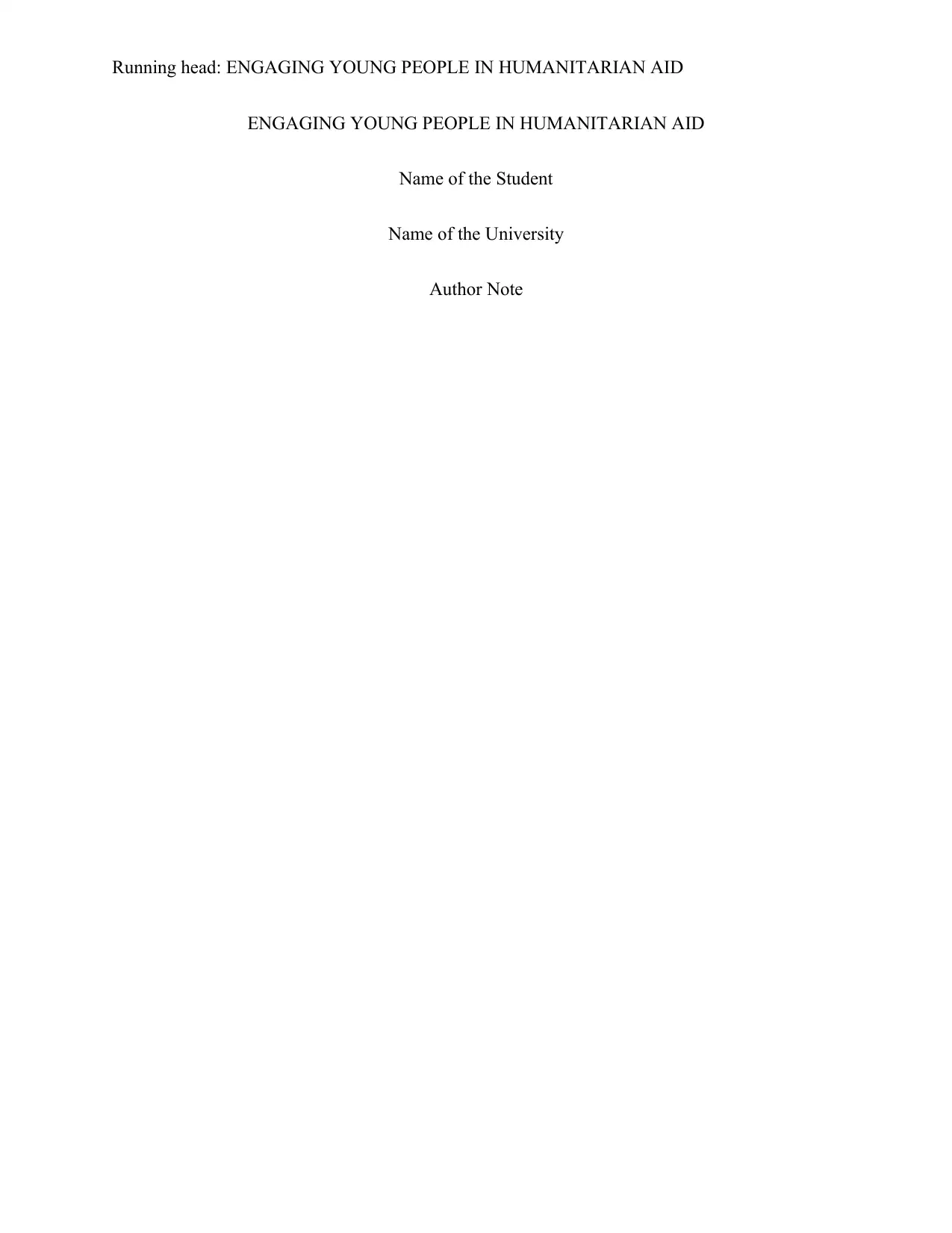
Running head: ENGAGING YOUNG PEOPLE IN HUMANITARIAN AID
ENGAGING YOUNG PEOPLE IN HUMANITARIAN AID
Name of the Student
Name of the University
Author Note
ENGAGING YOUNG PEOPLE IN HUMANITARIAN AID
Name of the Student
Name of the University
Author Note
Paraphrase This Document
Need a fresh take? Get an instant paraphrase of this document with our AI Paraphraser
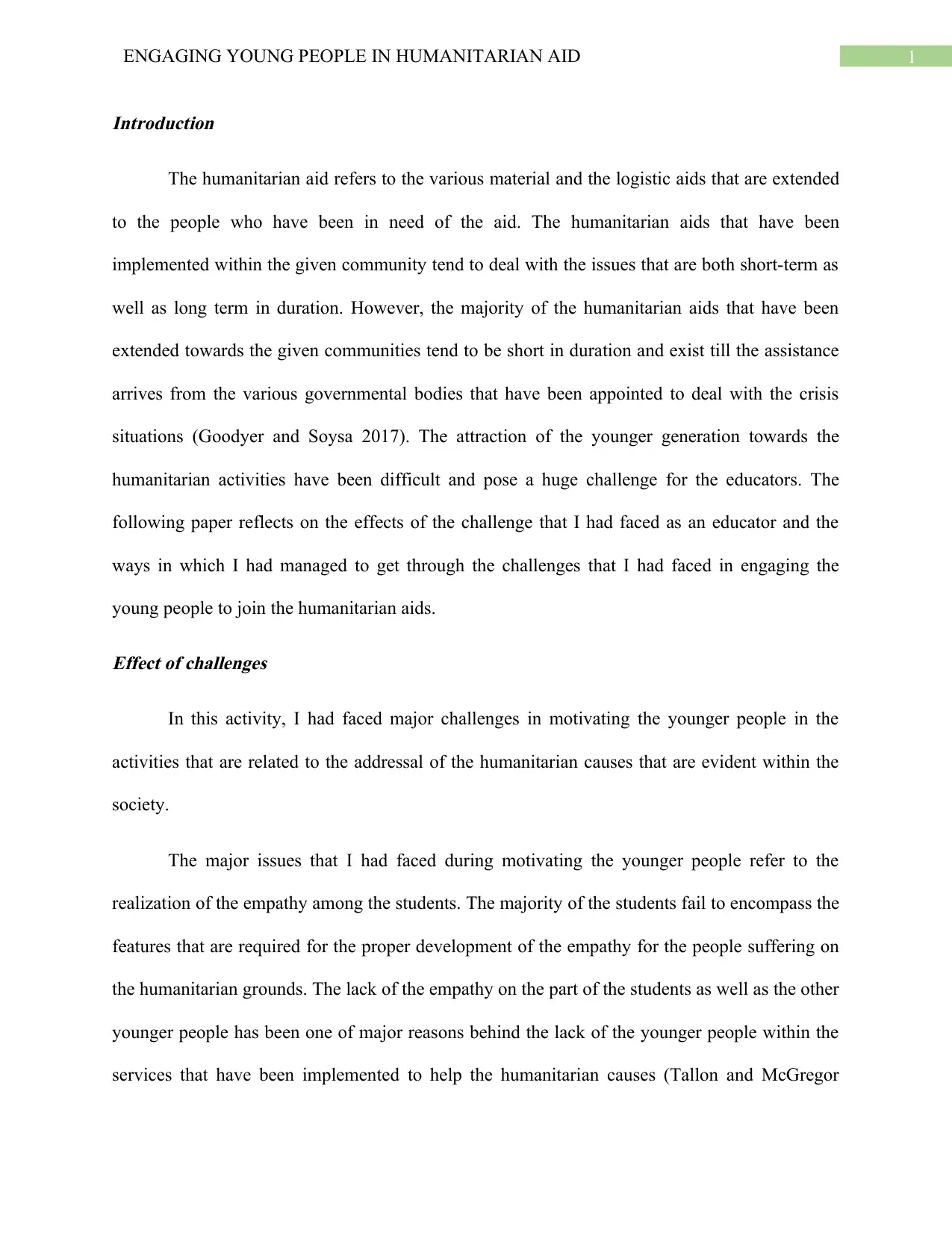
1ENGAGING YOUNG PEOPLE IN HUMANITARIAN AID
Introduction
The humanitarian aid refers to the various material and the logistic aids that are extended
to the people who have been in need of the aid. The humanitarian aids that have been
implemented within the given community tend to deal with the issues that are both short-term as
well as long term in duration. However, the majority of the humanitarian aids that have been
extended towards the given communities tend to be short in duration and exist till the assistance
arrives from the various governmental bodies that have been appointed to deal with the crisis
situations (Goodyer and Soysa 2017). The attraction of the younger generation towards the
humanitarian activities have been difficult and pose a huge challenge for the educators. The
following paper reflects on the effects of the challenge that I had faced as an educator and the
ways in which I had managed to get through the challenges that I had faced in engaging the
young people to join the humanitarian aids.
Effect of challenges
In this activity, I had faced major challenges in motivating the younger people in the
activities that are related to the addressal of the humanitarian causes that are evident within the
society.
The major issues that I had faced during motivating the younger people refer to the
realization of the empathy among the students. The majority of the students fail to encompass the
features that are required for the proper development of the empathy for the people suffering on
the humanitarian grounds. The lack of the empathy on the part of the students as well as the other
younger people has been one of major reasons behind the lack of the younger people within the
services that have been implemented to help the humanitarian causes (Tallon and McGregor
Introduction
The humanitarian aid refers to the various material and the logistic aids that are extended
to the people who have been in need of the aid. The humanitarian aids that have been
implemented within the given community tend to deal with the issues that are both short-term as
well as long term in duration. However, the majority of the humanitarian aids that have been
extended towards the given communities tend to be short in duration and exist till the assistance
arrives from the various governmental bodies that have been appointed to deal with the crisis
situations (Goodyer and Soysa 2017). The attraction of the younger generation towards the
humanitarian activities have been difficult and pose a huge challenge for the educators. The
following paper reflects on the effects of the challenge that I had faced as an educator and the
ways in which I had managed to get through the challenges that I had faced in engaging the
young people to join the humanitarian aids.
Effect of challenges
In this activity, I had faced major challenges in motivating the younger people in the
activities that are related to the addressal of the humanitarian causes that are evident within the
society.
The major issues that I had faced during motivating the younger people refer to the
realization of the empathy among the students. The majority of the students fail to encompass the
features that are required for the proper development of the empathy for the people suffering on
the humanitarian grounds. The lack of the empathy on the part of the students as well as the other
younger people has been one of major reasons behind the lack of the younger people within the
services that have been implemented to help the humanitarian causes (Tallon and McGregor
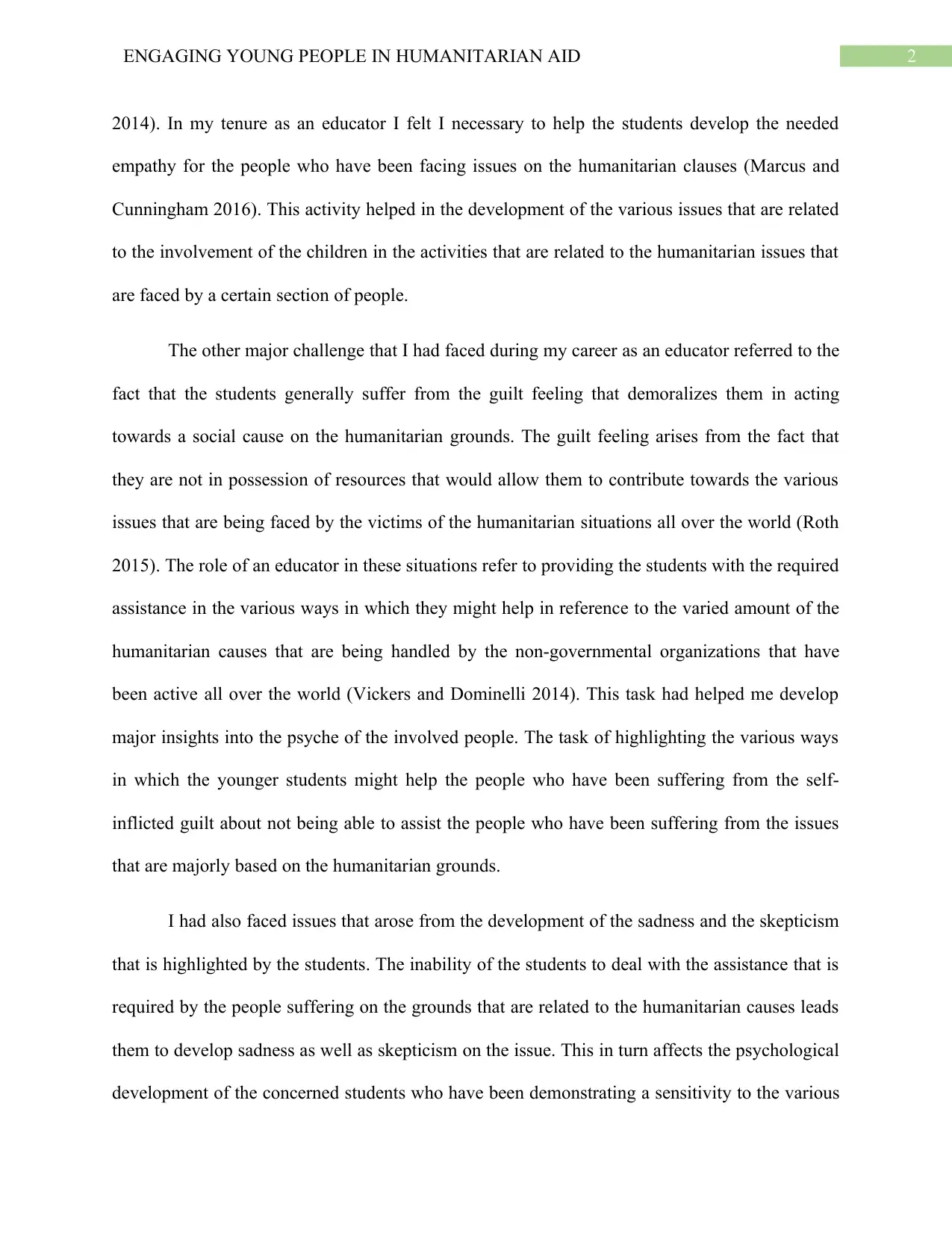
2ENGAGING YOUNG PEOPLE IN HUMANITARIAN AID
2014). In my tenure as an educator I felt I necessary to help the students develop the needed
empathy for the people who have been facing issues on the humanitarian clauses (Marcus and
Cunningham 2016). This activity helped in the development of the various issues that are related
to the involvement of the children in the activities that are related to the humanitarian issues that
are faced by a certain section of people.
The other major challenge that I had faced during my career as an educator referred to the
fact that the students generally suffer from the guilt feeling that demoralizes them in acting
towards a social cause on the humanitarian grounds. The guilt feeling arises from the fact that
they are not in possession of resources that would allow them to contribute towards the various
issues that are being faced by the victims of the humanitarian situations all over the world (Roth
2015). The role of an educator in these situations refer to providing the students with the required
assistance in the various ways in which they might help in reference to the varied amount of the
humanitarian causes that are being handled by the non-governmental organizations that have
been active all over the world (Vickers and Dominelli 2014). This task had helped me develop
major insights into the psyche of the involved people. The task of highlighting the various ways
in which the younger students might help the people who have been suffering from the self-
inflicted guilt about not being able to assist the people who have been suffering from the issues
that are majorly based on the humanitarian grounds.
I had also faced issues that arose from the development of the sadness and the skepticism
that is highlighted by the students. The inability of the students to deal with the assistance that is
required by the people suffering on the grounds that are related to the humanitarian causes leads
them to develop sadness as well as skepticism on the issue. This in turn affects the psychological
development of the concerned students who have been demonstrating a sensitivity to the various
2014). In my tenure as an educator I felt I necessary to help the students develop the needed
empathy for the people who have been facing issues on the humanitarian clauses (Marcus and
Cunningham 2016). This activity helped in the development of the various issues that are related
to the involvement of the children in the activities that are related to the humanitarian issues that
are faced by a certain section of people.
The other major challenge that I had faced during my career as an educator referred to the
fact that the students generally suffer from the guilt feeling that demoralizes them in acting
towards a social cause on the humanitarian grounds. The guilt feeling arises from the fact that
they are not in possession of resources that would allow them to contribute towards the various
issues that are being faced by the victims of the humanitarian situations all over the world (Roth
2015). The role of an educator in these situations refer to providing the students with the required
assistance in the various ways in which they might help in reference to the varied amount of the
humanitarian causes that are being handled by the non-governmental organizations that have
been active all over the world (Vickers and Dominelli 2014). This task had helped me develop
major insights into the psyche of the involved people. The task of highlighting the various ways
in which the younger students might help the people who have been suffering from the self-
inflicted guilt about not being able to assist the people who have been suffering from the issues
that are majorly based on the humanitarian grounds.
I had also faced issues that arose from the development of the sadness and the skepticism
that is highlighted by the students. The inability of the students to deal with the assistance that is
required by the people suffering on the grounds that are related to the humanitarian causes leads
them to develop sadness as well as skepticism on the issue. This in turn affects the psychological
development of the concerned students who have been demonstrating a sensitivity to the various
⊘ This is a preview!⊘
Do you want full access?
Subscribe today to unlock all pages.

Trusted by 1+ million students worldwide
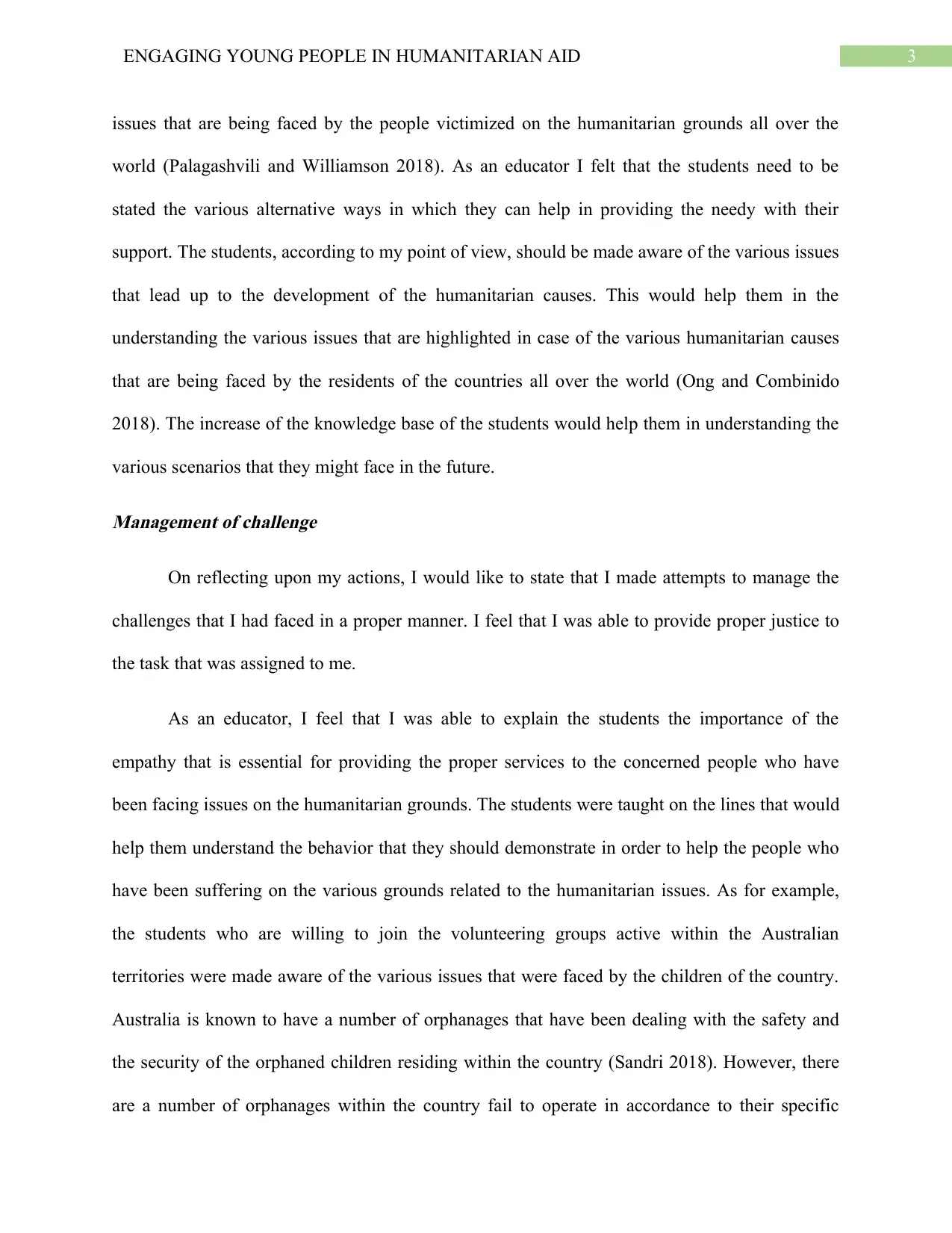
3ENGAGING YOUNG PEOPLE IN HUMANITARIAN AID
issues that are being faced by the people victimized on the humanitarian grounds all over the
world (Palagashvili and Williamson 2018). As an educator I felt that the students need to be
stated the various alternative ways in which they can help in providing the needy with their
support. The students, according to my point of view, should be made aware of the various issues
that lead up to the development of the humanitarian causes. This would help them in the
understanding the various issues that are highlighted in case of the various humanitarian causes
that are being faced by the residents of the countries all over the world (Ong and Combinido
2018). The increase of the knowledge base of the students would help them in understanding the
various scenarios that they might face in the future.
Management of challenge
On reflecting upon my actions, I would like to state that I made attempts to manage the
challenges that I had faced in a proper manner. I feel that I was able to provide proper justice to
the task that was assigned to me.
As an educator, I feel that I was able to explain the students the importance of the
empathy that is essential for providing the proper services to the concerned people who have
been facing issues on the humanitarian grounds. The students were taught on the lines that would
help them understand the behavior that they should demonstrate in order to help the people who
have been suffering on the various grounds related to the humanitarian issues. As for example,
the students who are willing to join the volunteering groups active within the Australian
territories were made aware of the various issues that were faced by the children of the country.
Australia is known to have a number of orphanages that have been dealing with the safety and
the security of the orphaned children residing within the country (Sandri 2018). However, there
are a number of orphanages within the country fail to operate in accordance to their specific
issues that are being faced by the people victimized on the humanitarian grounds all over the
world (Palagashvili and Williamson 2018). As an educator I felt that the students need to be
stated the various alternative ways in which they can help in providing the needy with their
support. The students, according to my point of view, should be made aware of the various issues
that lead up to the development of the humanitarian causes. This would help them in the
understanding the various issues that are highlighted in case of the various humanitarian causes
that are being faced by the residents of the countries all over the world (Ong and Combinido
2018). The increase of the knowledge base of the students would help them in understanding the
various scenarios that they might face in the future.
Management of challenge
On reflecting upon my actions, I would like to state that I made attempts to manage the
challenges that I had faced in a proper manner. I feel that I was able to provide proper justice to
the task that was assigned to me.
As an educator, I feel that I was able to explain the students the importance of the
empathy that is essential for providing the proper services to the concerned people who have
been facing issues on the humanitarian grounds. The students were taught on the lines that would
help them understand the behavior that they should demonstrate in order to help the people who
have been suffering on the various grounds related to the humanitarian issues. As for example,
the students who are willing to join the volunteering groups active within the Australian
territories were made aware of the various issues that were faced by the children of the country.
Australia is known to have a number of orphanages that have been dealing with the safety and
the security of the orphaned children residing within the country (Sandri 2018). However, there
are a number of orphanages within the country fail to operate in accordance to their specific
Paraphrase This Document
Need a fresh take? Get an instant paraphrase of this document with our AI Paraphraser
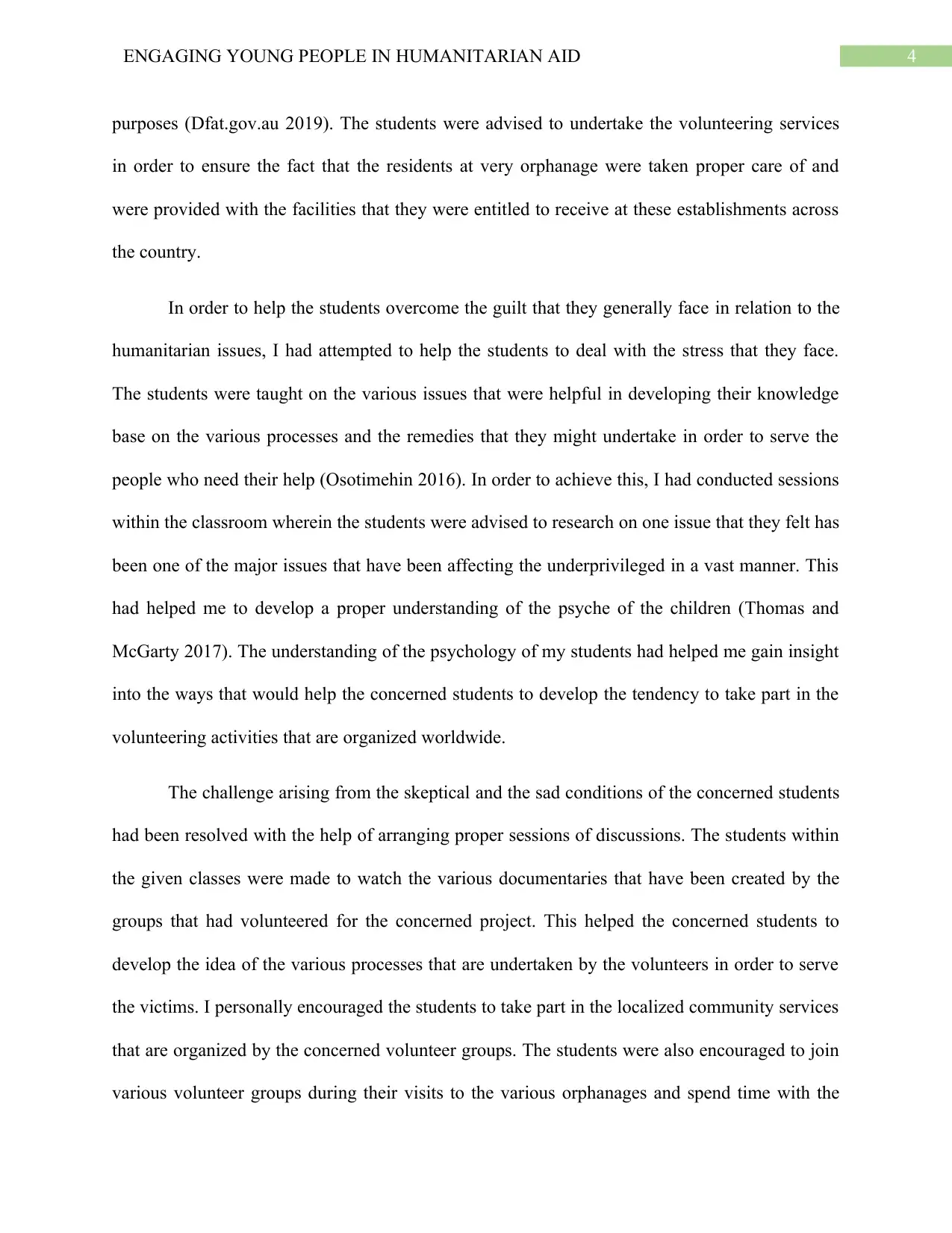
4ENGAGING YOUNG PEOPLE IN HUMANITARIAN AID
purposes (Dfat.gov.au 2019). The students were advised to undertake the volunteering services
in order to ensure the fact that the residents at very orphanage were taken proper care of and
were provided with the facilities that they were entitled to receive at these establishments across
the country.
In order to help the students overcome the guilt that they generally face in relation to the
humanitarian issues, I had attempted to help the students to deal with the stress that they face.
The students were taught on the various issues that were helpful in developing their knowledge
base on the various processes and the remedies that they might undertake in order to serve the
people who need their help (Osotimehin 2016). In order to achieve this, I had conducted sessions
within the classroom wherein the students were advised to research on one issue that they felt has
been one of the major issues that have been affecting the underprivileged in a vast manner. This
had helped me to develop a proper understanding of the psyche of the children (Thomas and
McGarty 2017). The understanding of the psychology of my students had helped me gain insight
into the ways that would help the concerned students to develop the tendency to take part in the
volunteering activities that are organized worldwide.
The challenge arising from the skeptical and the sad conditions of the concerned students
had been resolved with the help of arranging proper sessions of discussions. The students within
the given classes were made to watch the various documentaries that have been created by the
groups that had volunteered for the concerned project. This helped the concerned students to
develop the idea of the various processes that are undertaken by the volunteers in order to serve
the victims. I personally encouraged the students to take part in the localized community services
that are organized by the concerned volunteer groups. The students were also encouraged to join
various volunteer groups during their visits to the various orphanages and spend time with the
purposes (Dfat.gov.au 2019). The students were advised to undertake the volunteering services
in order to ensure the fact that the residents at very orphanage were taken proper care of and
were provided with the facilities that they were entitled to receive at these establishments across
the country.
In order to help the students overcome the guilt that they generally face in relation to the
humanitarian issues, I had attempted to help the students to deal with the stress that they face.
The students were taught on the various issues that were helpful in developing their knowledge
base on the various processes and the remedies that they might undertake in order to serve the
people who need their help (Osotimehin 2016). In order to achieve this, I had conducted sessions
within the classroom wherein the students were advised to research on one issue that they felt has
been one of the major issues that have been affecting the underprivileged in a vast manner. This
had helped me to develop a proper understanding of the psyche of the children (Thomas and
McGarty 2017). The understanding of the psychology of my students had helped me gain insight
into the ways that would help the concerned students to develop the tendency to take part in the
volunteering activities that are organized worldwide.
The challenge arising from the skeptical and the sad conditions of the concerned students
had been resolved with the help of arranging proper sessions of discussions. The students within
the given classes were made to watch the various documentaries that have been created by the
groups that had volunteered for the concerned project. This helped the concerned students to
develop the idea of the various processes that are undertaken by the volunteers in order to serve
the victims. I personally encouraged the students to take part in the localized community services
that are organized by the concerned volunteer groups. The students were also encouraged to join
various volunteer groups during their visits to the various orphanages and spend time with the
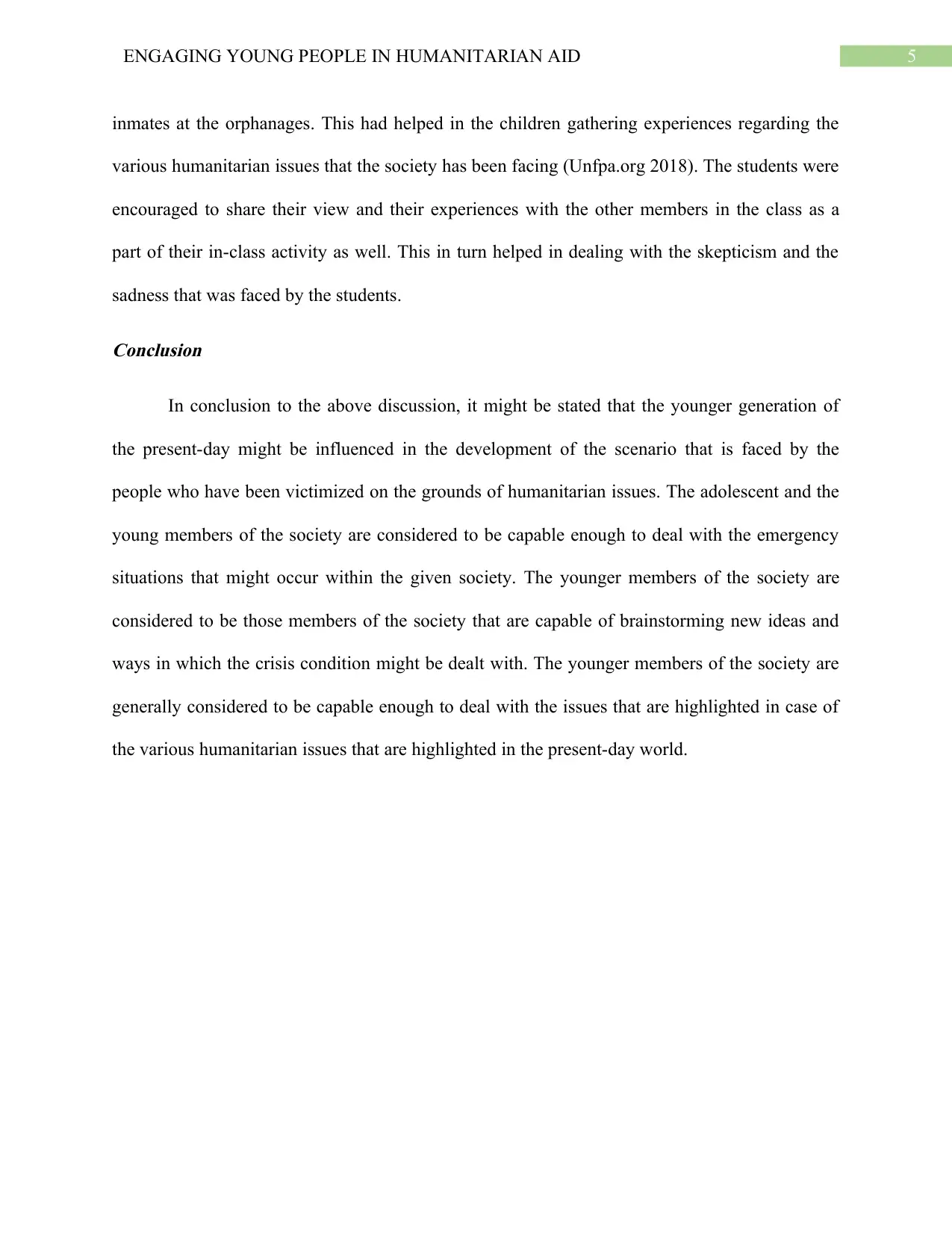
5ENGAGING YOUNG PEOPLE IN HUMANITARIAN AID
inmates at the orphanages. This had helped in the children gathering experiences regarding the
various humanitarian issues that the society has been facing (Unfpa.org 2018). The students were
encouraged to share their view and their experiences with the other members in the class as a
part of their in-class activity as well. This in turn helped in dealing with the skepticism and the
sadness that was faced by the students.
Conclusion
In conclusion to the above discussion, it might be stated that the younger generation of
the present-day might be influenced in the development of the scenario that is faced by the
people who have been victimized on the grounds of humanitarian issues. The adolescent and the
young members of the society are considered to be capable enough to deal with the emergency
situations that might occur within the given society. The younger members of the society are
considered to be those members of the society that are capable of brainstorming new ideas and
ways in which the crisis condition might be dealt with. The younger members of the society are
generally considered to be capable enough to deal with the issues that are highlighted in case of
the various humanitarian issues that are highlighted in the present-day world.
inmates at the orphanages. This had helped in the children gathering experiences regarding the
various humanitarian issues that the society has been facing (Unfpa.org 2018). The students were
encouraged to share their view and their experiences with the other members in the class as a
part of their in-class activity as well. This in turn helped in dealing with the skepticism and the
sadness that was faced by the students.
Conclusion
In conclusion to the above discussion, it might be stated that the younger generation of
the present-day might be influenced in the development of the scenario that is faced by the
people who have been victimized on the grounds of humanitarian issues. The adolescent and the
young members of the society are considered to be capable enough to deal with the emergency
situations that might occur within the given society. The younger members of the society are
considered to be those members of the society that are capable of brainstorming new ideas and
ways in which the crisis condition might be dealt with. The younger members of the society are
generally considered to be capable enough to deal with the issues that are highlighted in case of
the various humanitarian issues that are highlighted in the present-day world.
⊘ This is a preview!⊘
Do you want full access?
Subscribe today to unlock all pages.

Trusted by 1+ million students worldwide
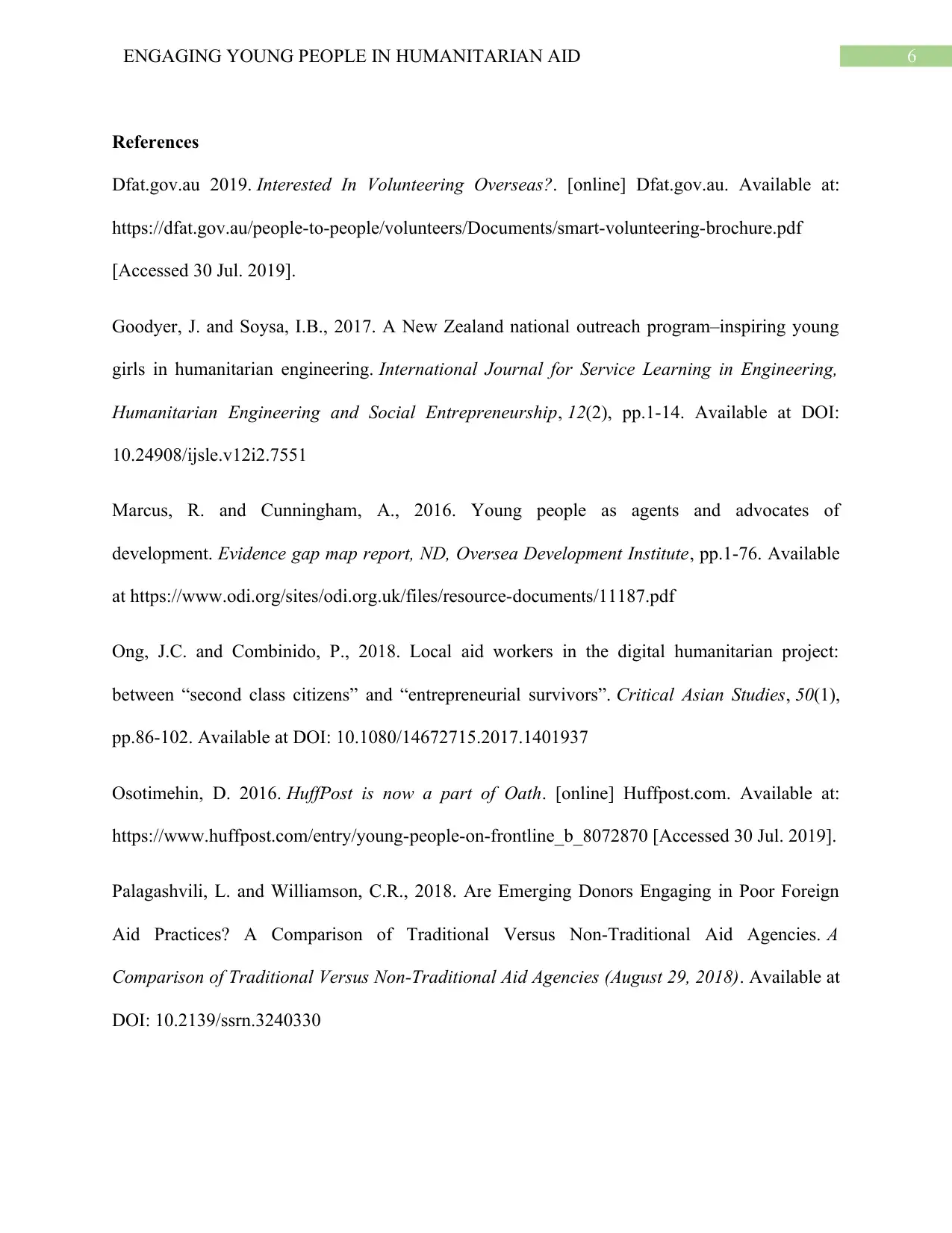
6ENGAGING YOUNG PEOPLE IN HUMANITARIAN AID
References
Dfat.gov.au 2019. Interested In Volunteering Overseas?. [online] Dfat.gov.au. Available at:
https://dfat.gov.au/people-to-people/volunteers/Documents/smart-volunteering-brochure.pdf
[Accessed 30 Jul. 2019].
Goodyer, J. and Soysa, I.B., 2017. A New Zealand national outreach program–inspiring young
girls in humanitarian engineering. International Journal for Service Learning in Engineering,
Humanitarian Engineering and Social Entrepreneurship, 12(2), pp.1-14. Available at DOI:
10.24908/ijsle.v12i2.7551
Marcus, R. and Cunningham, A., 2016. Young people as agents and advocates of
development. Evidence gap map report, ND, Oversea Development Institute, pp.1-76. Available
at https://www.odi.org/sites/odi.org.uk/files/resource-documents/11187.pdf
Ong, J.C. and Combinido, P., 2018. Local aid workers in the digital humanitarian project:
between “second class citizens” and “entrepreneurial survivors”. Critical Asian Studies, 50(1),
pp.86-102. Available at DOI: 10.1080/14672715.2017.1401937
Osotimehin, D. 2016. HuffPost is now a part of Oath. [online] Huffpost.com. Available at:
https://www.huffpost.com/entry/young-people-on-frontline_b_8072870 [Accessed 30 Jul. 2019].
Palagashvili, L. and Williamson, C.R., 2018. Are Emerging Donors Engaging in Poor Foreign
Aid Practices? A Comparison of Traditional Versus Non-Traditional Aid Agencies. A
Comparison of Traditional Versus Non-Traditional Aid Agencies (August 29, 2018). Available at
DOI: 10.2139/ssrn.3240330
References
Dfat.gov.au 2019. Interested In Volunteering Overseas?. [online] Dfat.gov.au. Available at:
https://dfat.gov.au/people-to-people/volunteers/Documents/smart-volunteering-brochure.pdf
[Accessed 30 Jul. 2019].
Goodyer, J. and Soysa, I.B., 2017. A New Zealand national outreach program–inspiring young
girls in humanitarian engineering. International Journal for Service Learning in Engineering,
Humanitarian Engineering and Social Entrepreneurship, 12(2), pp.1-14. Available at DOI:
10.24908/ijsle.v12i2.7551
Marcus, R. and Cunningham, A., 2016. Young people as agents and advocates of
development. Evidence gap map report, ND, Oversea Development Institute, pp.1-76. Available
at https://www.odi.org/sites/odi.org.uk/files/resource-documents/11187.pdf
Ong, J.C. and Combinido, P., 2018. Local aid workers in the digital humanitarian project:
between “second class citizens” and “entrepreneurial survivors”. Critical Asian Studies, 50(1),
pp.86-102. Available at DOI: 10.1080/14672715.2017.1401937
Osotimehin, D. 2016. HuffPost is now a part of Oath. [online] Huffpost.com. Available at:
https://www.huffpost.com/entry/young-people-on-frontline_b_8072870 [Accessed 30 Jul. 2019].
Palagashvili, L. and Williamson, C.R., 2018. Are Emerging Donors Engaging in Poor Foreign
Aid Practices? A Comparison of Traditional Versus Non-Traditional Aid Agencies. A
Comparison of Traditional Versus Non-Traditional Aid Agencies (August 29, 2018). Available at
DOI: 10.2139/ssrn.3240330
Paraphrase This Document
Need a fresh take? Get an instant paraphrase of this document with our AI Paraphraser
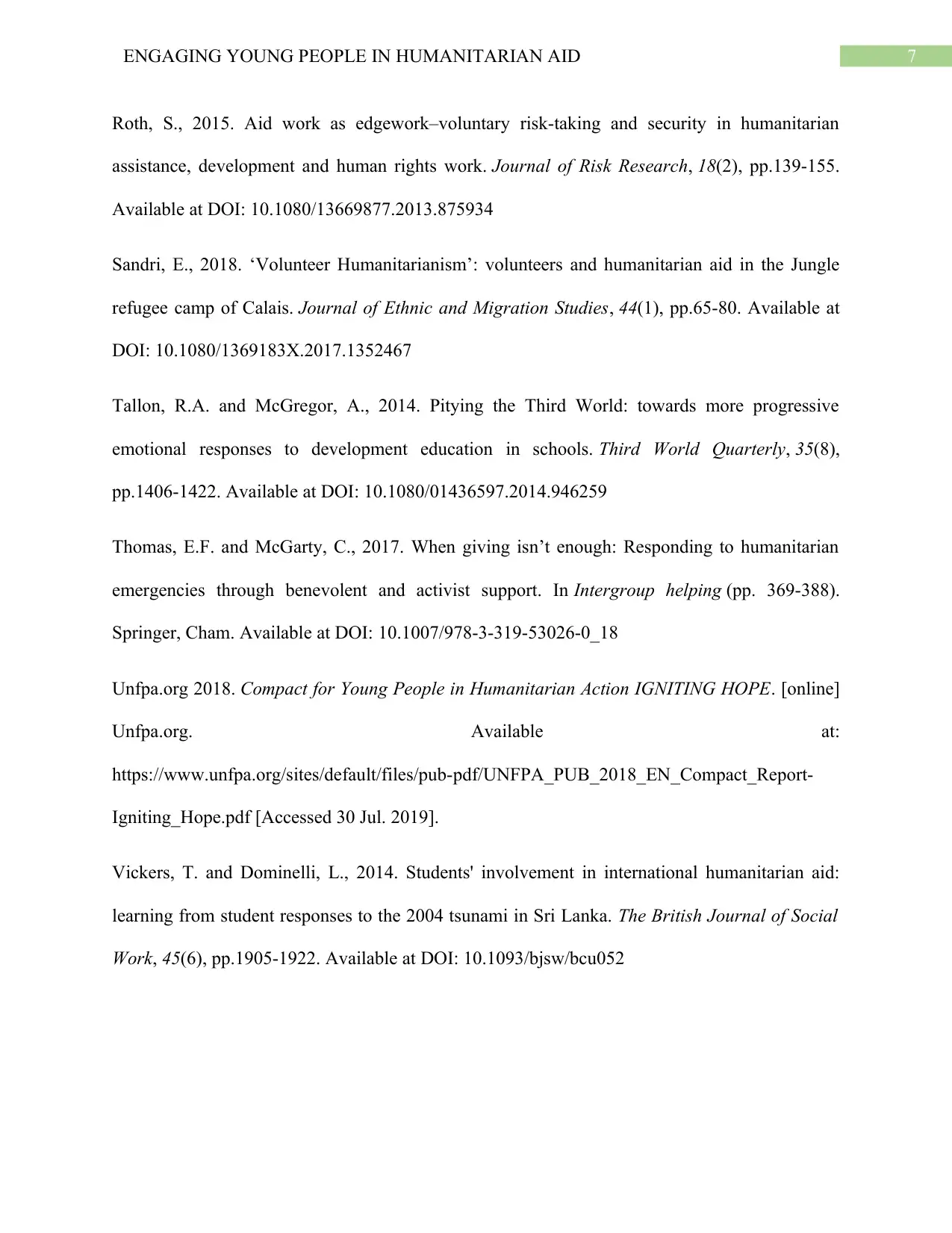
7ENGAGING YOUNG PEOPLE IN HUMANITARIAN AID
Roth, S., 2015. Aid work as edgework–voluntary risk-taking and security in humanitarian
assistance, development and human rights work. Journal of Risk Research, 18(2), pp.139-155.
Available at DOI: 10.1080/13669877.2013.875934
Sandri, E., 2018. ‘Volunteer Humanitarianism’: volunteers and humanitarian aid in the Jungle
refugee camp of Calais. Journal of Ethnic and Migration Studies, 44(1), pp.65-80. Available at
DOI: 10.1080/1369183X.2017.1352467
Tallon, R.A. and McGregor, A., 2014. Pitying the Third World: towards more progressive
emotional responses to development education in schools. Third World Quarterly, 35(8),
pp.1406-1422. Available at DOI: 10.1080/01436597.2014.946259
Thomas, E.F. and McGarty, C., 2017. When giving isn’t enough: Responding to humanitarian
emergencies through benevolent and activist support. In Intergroup helping (pp. 369-388).
Springer, Cham. Available at DOI: 10.1007/978-3-319-53026-0_18
Unfpa.org 2018. Compact for Young People in Humanitarian Action IGNITING HOPE. [online]
Unfpa.org. Available at:
https://www.unfpa.org/sites/default/files/pub-pdf/UNFPA_PUB_2018_EN_Compact_Report-
Igniting_Hope.pdf [Accessed 30 Jul. 2019].
Vickers, T. and Dominelli, L., 2014. Students' involvement in international humanitarian aid:
learning from student responses to the 2004 tsunami in Sri Lanka. The British Journal of Social
Work, 45(6), pp.1905-1922. Available at DOI: 10.1093/bjsw/bcu052
Roth, S., 2015. Aid work as edgework–voluntary risk-taking and security in humanitarian
assistance, development and human rights work. Journal of Risk Research, 18(2), pp.139-155.
Available at DOI: 10.1080/13669877.2013.875934
Sandri, E., 2018. ‘Volunteer Humanitarianism’: volunteers and humanitarian aid in the Jungle
refugee camp of Calais. Journal of Ethnic and Migration Studies, 44(1), pp.65-80. Available at
DOI: 10.1080/1369183X.2017.1352467
Tallon, R.A. and McGregor, A., 2014. Pitying the Third World: towards more progressive
emotional responses to development education in schools. Third World Quarterly, 35(8),
pp.1406-1422. Available at DOI: 10.1080/01436597.2014.946259
Thomas, E.F. and McGarty, C., 2017. When giving isn’t enough: Responding to humanitarian
emergencies through benevolent and activist support. In Intergroup helping (pp. 369-388).
Springer, Cham. Available at DOI: 10.1007/978-3-319-53026-0_18
Unfpa.org 2018. Compact for Young People in Humanitarian Action IGNITING HOPE. [online]
Unfpa.org. Available at:
https://www.unfpa.org/sites/default/files/pub-pdf/UNFPA_PUB_2018_EN_Compact_Report-
Igniting_Hope.pdf [Accessed 30 Jul. 2019].
Vickers, T. and Dominelli, L., 2014. Students' involvement in international humanitarian aid:
learning from student responses to the 2004 tsunami in Sri Lanka. The British Journal of Social
Work, 45(6), pp.1905-1922. Available at DOI: 10.1093/bjsw/bcu052
1 out of 8
Related Documents
Your All-in-One AI-Powered Toolkit for Academic Success.
+13062052269
info@desklib.com
Available 24*7 on WhatsApp / Email
![[object Object]](/_next/static/media/star-bottom.7253800d.svg)
Unlock your academic potential
Copyright © 2020–2025 A2Z Services. All Rights Reserved. Developed and managed by ZUCOL.




